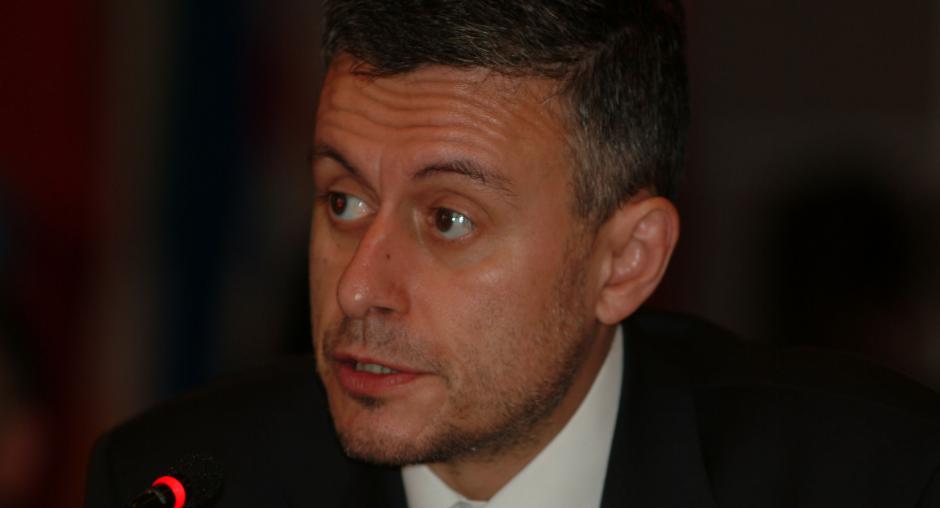Newsroom
OSCE Chairman-in-Office calls for transformation of Organization
EDINBURGH 6 July 2004

The OSCE Chairman-in-Office, Bulgarian Foreign Minister Solomon Passy. (OSCE/Alex Nitzsche) Photo details
EDINBURGH, 6 July 2004 - OSCE Chairman-in-Office Solomon Passy called on Monday for substantial reform of the 55-nation security organization, saying it needed to reassess its political priorities, and expressed hope that OSCE heads of state and government would soon hold a summit meeting.
"I believe that the OSCE is in need of transformation and I believe that the transformation process should start right away," the Bulgarian Foreign Minister told the 13th Annual Session of the OSCE Parliamentary Assembly in Edinburgh, Scotland.
Other organizations such as NATO and the European Union were already undergoing a process of transformation to respond to changing security priorities.
"What the Organization needs is political leadership. Increased attention to the OSCE at the political level in capitals would be a necessary and welcome development," the Chairman-in-Office said.
The Minister said the OSCE continued to play a key role in conflict prevention and democratization. "The OSCE has a thick catalogue of commitments and a toolbox full of instruments and we should ensure that these are effectively applied to promote security and co-operation in the OSCE area."
"It is important to take stock of how our capabilities match our political expectations, to consolidate what we have done in the past few years of rapid growth and to look at how the OSCE can be transformed to deal with the evolving international environment," he added.
He noted that there were huge geographic imbalances in the distribution of the budget among different areas, with some 50 per cent of resources allocated to South Eastern Europe while only six percent was spent in Central Asia and 15 percent in the Caucasus.
The Minister said major OSCE conferences and events, which tend to take place mainly in cities such as Vienna, Warsaw and Prague, should be shared out among countries throughout the region.
"Shouldn't activities be refocused and some of them gradually be relocated to capitals like Baku, Yerevan, Tbilisi, Dushanbe, Bishkek, Ashgabad, Astana, Tashkent, Moscow, Kiev, Minsk, Chisinau or other places to better reflect the Organization's wide horizons and rich diversity?" he asked.
Minister Passy said the role of the Secretary General should be upgraded to help provide continuity and improve the Organization's institutional memory.
"Unlike holders of similar posts in other international organizations, the political prerogatives of our Secretary General are too limited - in practice they boil down to advising the Chairman-in-Office."
Procedures for selecting and appointing heads of OSCE field missions and heads of institutions should be reviewed.
The OSCE needed to make relations with its Partners for Co-operation in the Mediterranean and Asia more fruitful and do more to share OSCE principles and commitments with non-OSCE countries. "Our relations with Afghanistan deserve particular attention," Minister Passy said.
He expressed hope that OSCE foreign ministers would agree to transform the Organization when they meet for their annual Ministerial Council in Sofia in December, adding: "The whole process, if so agreed, could be endorsed and further developed at an OSCE Summit."
"I believe that the OSCE is in need of transformation and I believe that the transformation process should start right away," the Bulgarian Foreign Minister told the 13th Annual Session of the OSCE Parliamentary Assembly in Edinburgh, Scotland.
Other organizations such as NATO and the European Union were already undergoing a process of transformation to respond to changing security priorities.
"What the Organization needs is political leadership. Increased attention to the OSCE at the political level in capitals would be a necessary and welcome development," the Chairman-in-Office said.
The Minister said the OSCE continued to play a key role in conflict prevention and democratization. "The OSCE has a thick catalogue of commitments and a toolbox full of instruments and we should ensure that these are effectively applied to promote security and co-operation in the OSCE area."
"It is important to take stock of how our capabilities match our political expectations, to consolidate what we have done in the past few years of rapid growth and to look at how the OSCE can be transformed to deal with the evolving international environment," he added.
He noted that there were huge geographic imbalances in the distribution of the budget among different areas, with some 50 per cent of resources allocated to South Eastern Europe while only six percent was spent in Central Asia and 15 percent in the Caucasus.
The Minister said major OSCE conferences and events, which tend to take place mainly in cities such as Vienna, Warsaw and Prague, should be shared out among countries throughout the region.
"Shouldn't activities be refocused and some of them gradually be relocated to capitals like Baku, Yerevan, Tbilisi, Dushanbe, Bishkek, Ashgabad, Astana, Tashkent, Moscow, Kiev, Minsk, Chisinau or other places to better reflect the Organization's wide horizons and rich diversity?" he asked.
Minister Passy said the role of the Secretary General should be upgraded to help provide continuity and improve the Organization's institutional memory.
"Unlike holders of similar posts in other international organizations, the political prerogatives of our Secretary General are too limited - in practice they boil down to advising the Chairman-in-Office."
Procedures for selecting and appointing heads of OSCE field missions and heads of institutions should be reviewed.
The OSCE needed to make relations with its Partners for Co-operation in the Mediterranean and Asia more fruitful and do more to share OSCE principles and commitments with non-OSCE countries. "Our relations with Afghanistan deserve particular attention," Minister Passy said.
He expressed hope that OSCE foreign ministers would agree to transform the Organization when they meet for their annual Ministerial Council in Sofia in December, adding: "The whole process, if so agreed, could be endorsed and further developed at an OSCE Summit."
